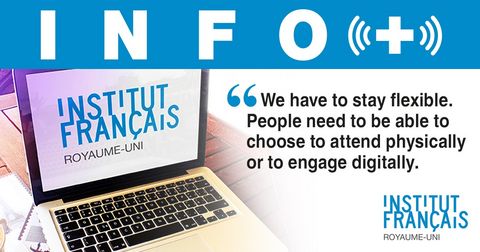Companies news • Interview • Members
Doors open at the French Institute

The French Institute re-opens with a new focus on hybrid events and a boosted digital offering, says its Director and Cultural Counsellor to the French Ambassador, Claudine Ripert-Landler.
After a swift digital transformation at the outset of the lockdown, the French Institute has reopened its doors, including a retrofit of the iconic Ciné Lumière and relatively newly-added Café Tangerine, offering a new programme mix of onsite and online events.
‘There was such an expectation on the culture offer through the lockdown,’ says Ripert-Landler, as the appetite for digital culture grew quickly among Londoners and the audience of the Institute.
‘It pushed us to be more creative and to accelerate our digital offer in the context of a lot of competition, as many cultural organisations and institutions were also quickly moving into the space.’
This included opening up their digital library of books, films and music collections via La Médiathèque’s Click & Collect service, and providing exclusive digital interview with authors and artists. Their festival of French literature Beyond Words, scheduled in May, also made the leap in to exclusively digital formats.
Their French language courses are also set to return in a hybrid format, with a mix of online and offline teaching. After closing in March, the language school moved from a physical classroom to a digital one in record time – an operation with more than eighty teachers, necessitating not only a digital transition but the on-boarding of new digital teaching tools.
Will the audiences come back? ‘This has been the conversation which has dominated our conversations since mid-May,’ says Ripert-Landler. ‘Our approach from August has been a progressive reopening, we didn’t just flip the switch.’
‘What we feel is that our multi-disciplinary way to present the content is important, and it mirrors how the artists are thinking about their work as well,’ says Ripert-Landler. ‘You can bring multiple forms together, like cinema, debate and drawing, and offer a digital component for people to be able to engage and participate with the content.’
Their approach includes a staggered return to activities, such as in a targeted programme at the cinema, a strong focus on opportunities for hybrid events and social media engagement. Social distancing rules have been strictly observed in their physical spaces, as well as a policy of face covering in all areas of the building.
The approach was helped by information-sharing between cultural organisations in France and the UK, including a consortium of institutions on Exhibition Road made up of the Science Museum, the Museum of Natural History and others.
‘Sharing a cultural experience in safe hands is key in this moment,’ says Ripert-Landler, whose strategy also includes reaching out to new audiences through digital content and renewing how visitors are welcomed in their physical spaces.
Connexions, a major project at the Institute, aims to engage all visitors with an exceptional cultural experience in their South Kensington premises, with a specific ambition towards hard-to-reach audiences.
This includes investment in tech facilities, automated and digitised systems to regulate audiences flows, and an offer to visitors of a smooth and enjoyable cultural experience.
There is also new interior design with revamped acoustics and lighting highlighting the features and grandeur of the exceptional Art Deco foyer, and improved accessibility by implementing a new elevator linking the ground floor and the basement level, making the Cinéma II accessible to all, including visitors with disabilities.
‘We have to stay flexible. People need to be able to choose to attend physically or to engage digitally. We know when they do come, the feedback has been extremely positive, and people have felt safe and engaged with our physical spaces and events.’
The Institute has already raised more than half of the sum of £450,000 from private donors to fund the large-scale project – a further £200,000 is needed to complete plans.
For Ripert-Landler, this project and the Institute’s schedule of upcoming events haven taken on a particular significance: ‘The role of the French Institute has never been so relevant – although it is challenging time, marked by both Brexit and the Covid-19 pandemic, it has never so important to have a bilateral exchange between France and Britain.’
This article was published in INFO Magazine Autumn 2020: How business will adapt. Read the whole issue here.